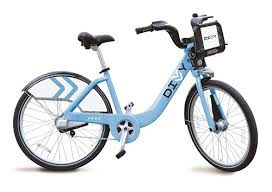| « Temper Your Anxiety About Bulls' Quiet Offseason | White Sox Get Boost at Catcher with Phegley » |
Bicycling Thu Jul 11 2013
There Are More Bikes But Are There More Helmets?
 Here's an equation that I ask you to solve: bicycles + cyclists unfamiliar with Chicago bike laws - helmets = ? Read on, come back and fill in your answer.
Here's an equation that I ask you to solve: bicycles + cyclists unfamiliar with Chicago bike laws - helmets = ? Read on, come back and fill in your answer.
If you haven't noticed, Chicago has a new bike-share program called the Divvy bike-share program. There are racks of bikes set up all through the city and people can rent them for limited periods of time. There will be 300 bike-share stations open in Chicago by August. You can rent a bike from one rack and return it to another. You may have seen these bikes around (photo above).
I'm a big fan of the Divvy bike-share program. Think of some of the benefits of the bike-share program. It'll be good for our environment, our pocket books and our health. With more bikes on the road, traffic will be calmed. Also, with more bikes on the road, hopefully cyclists will get something they really need - a louder voice regarding bike safety laws.
Please understand that I'm not a big fan of mandatory helmet laws. People who oppose mandatory helmet laws would argue that such laws discourage ridership and that safety benefits associated with helmets are outweighed by the cost of foregone health benefits from less cycling taking place.
Some folks who oppose mandatory helmet laws would argue that helmets do not provide the safety results claimed by the statistics. However, those stats cannot be ignored. Recently, the City of Chicago performed a study which took a hard look at bike crashes in the city. The numbers showed that "between 2005 and 2010, there were nearly 9,000 injury crashes involving bicyclists, with 32 bicyclist fatalities." In the same period, as a percentage of all traffic crashes, bicycle crashes increased. Not surprisingly the report makes the point that "...with proper street design and behavior change amongst people who use the road, most bicycle crashes are preventable." Read the full 64 page study here.
The end of the study looked at potential solutions to the crash problems, including protected bike lanes (PBLs) and raising public awareness as options. Undoubtedly, these are good options. That being said, with the Divvy bike-share program, there will be more bikes on the road, many of them being ridden by people who may not know Chicago bike safety laws very well. Common sense dictates that in the near future, there will be more bicycle crashes and probably more collisions involving head injuries and perhaps fatalities.
Now, I don't mean to rain on Divvy's parade and I'm not proposing mandatory helmet laws. However, we must recognize that there will now be people cycling through the busy streets of Chicago, some of them, tourists, without helmets. My gut tells me that there will be an increase in head injuries and fatalities. Of course, I hope I'm wrong. However, one thing I'm certain that I'm right about is that helmets prevent head injuries and save lives.
According to the National Highway Traffic Safety Administration (NHTSA), 70 percent of all fatal bicycle crashes involve head injuries. The use of helmets is the best way to reduce head injuries and fatalities from bicycle crashes as helmets are approximately 85 percent effective in mitigating head and brain injuries, says the NHTSA.
Chicago is ranked 5 on Bicycling Magazine's annual list of America's most bike-friendly cities. Nevertheless, riding a bike in Chicago is still a proceed-at-your-own-risk activity. No helmet requirements, a lack of PBLs (hopefully only for the short term), inexperienced cyclists and motorists who fail to understand that they must share the road with cyclists make for a dangerous combination. I think it is important that city officials use their best efforts to encourage, not mandate, helmet use. Even more important is that we, as individuals, encourage our friends and loved ones to wear a helmet while riding a bicycle. By doing so, we just may save a life.









John Greenfield / July 11, 2013 9:07 AM
The federal government recently acknowledged that the 85% effectiveness rate of helmets was obsolete data that they continued to use regardless: http://newswithtags.com/Traffic%20collision/waba-feds-withdraw-claim-that-bike-helmets-are-85-percent-effective#.Ud67OlPjYUs